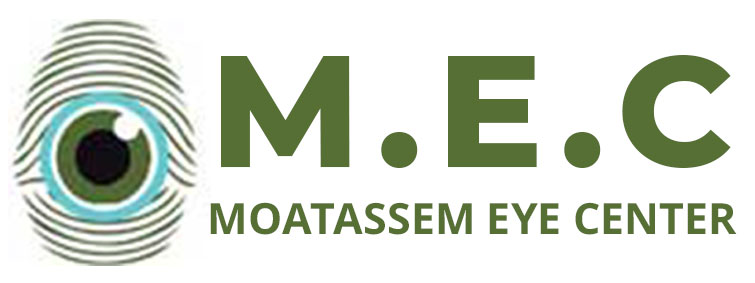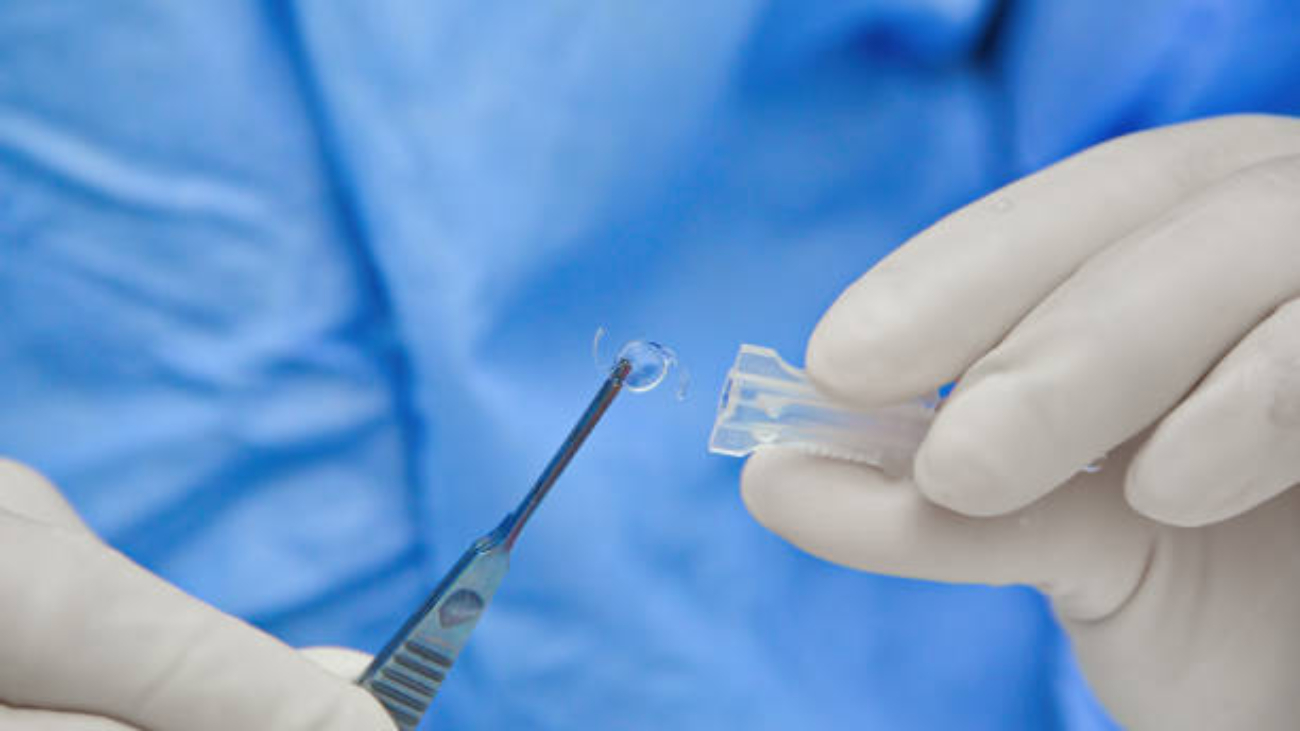Hyperopia, myopia, and many other refractive errors can progress over time, leading to damage of the eye’s lens, Often, this damage becomes untreatable with laser surgery or other conventional methods.prompting doctors to turn to a safe, reliable, and definitive solution: intraocular lens (IOL) implantation. These lenses correct all vision problems, similar to therapeutic contact lensesو but many wonder about the cost of intraocular lens implantation in Dubai. particularly at El-Moatassem European Center, which boasts elite ophthalmologists. cutting-edge technology, and comprehensive healthcare. Let’s explore the cost and full details of this procedure.
What Is Intraocular Lens Implantation?
This is one of the most important therapeutic procedures for refractive errors and eye conditions. It involves implanting specialized corrective lenses inside the eyeball to address refractive issues.
Unlike conventional contact lenses, which sit on the outer surface of the eye.
these corrective lenses are implanted inside the eye, specifically in front of the natural lens.
This is an excellent solution for individuals who are not suitable candidates for laser vision correction or similar procedures.
Cases That Require Intraocular Lens Implantation
Intraocular lens implantation in Dubai is not a primary procedure but rather an advanced treatment for severe refractive errors that cannot be corrected with other methods. Eligible conditions include:
- Hyperopia (Farsightedness): The corrective lenses improve the eye’s ability to see nearby objects clearly, which hyperopic patients struggle with.
- Myopia (Nearsightedness): Patients with myopia can see distant objects but struggle with near vision. The implanted lenses enhance near vision, reducing dependence on glasses.
- Presbyopia (Age-Related Farsightedness): A common condition where patients gradually lose near vision around age 65. The lenses correct vision, minimizing the need for reading glasses.
- Astigmatism: Caused by an irregular corneal surface, these lenses help reshape the cornea for precise vision correction.
Additionally, ideal candidates for IOL implantation should be between 18 and 60 years old.
have good overall eye health with no chronic or systemic diseases affecting the eyes.
and preferably have no prior eye surgeries.
Advantages of Intraocular Lens Implantation
Before discussing the cost of intraocular lens (IOL) implantation in Dubai.
it’s essential to highlight the key advantages of this procedure.
which have contributed to its growing popularity. These benefits include:
- Enhanced Vision Clarity and improved near and distant vision without the need for glasses or contact lenses.
- Safe Alternative for Severe Myopia avoids corneal tissue removal (unlike traditional LASIK) by simply implanting a corrective lens.
- Adjustable & Reversible lenses can be replaced or removed later if needed (though rare), offering flexibility.
- Quick & Minimally Invasive=, nearly painless outpatient procedure.
- UV Protection, Implanted lenses provide high protection against harmful ultraviolet rays.
- Biocompatibility, Zero risk of immune rejection; lenses integrate naturally with eye tissues and require no maintenance.
- No Dry Eye Syndrome, Unlike other eye surgeries, IOL implantation rarely causes dry eye discomfort.
- Wide Range of Options, Multiple lens types available to treat all refractive errors effectively.
- High Patient Satisfaction, thousands of patients report rapid, life-changing vision improvement.
Types of Implantable Intraocular Lenses
The cost of intraocular lens implantation in Dubai varies depending on the type of lens used.
There isn’t just one type of lens, but rather multiple varieties, each suited to specific visual impairments and general eye health requirements. Among the most prominent types of intraocular lenses widely used at El-Moatassem European Center in Dubai are:
Lens classification
- Monofocal Lenses:
- These lenses correct only one focal point, addressing either near, intermediate, or distance vision problems. They are particularly important for cases involving difficulty with near or far vision, challenges with driving, or impaired vision even with glasses.
- Multifocal Lenses: These lenses do not merely correct a single focal point but can simultaneously address both near and distance vision issues, thanks to their multiple focal points. When using this type of lens, vision correction may take some time as the brain adapts to them.
- Toric Lenses: These lenses are among the most important treatments for astigmatism, enhancing visual clarity and addressing issues like light halos and glare. Toric lenses come in various types, including monofocal and multifocal versions, among others.
- Phakic Intraocular Lenses (Phakic IOLs): These lenses treat myopia while preserving the eye’s natural lens. They are an ideal solution for patients with high myopia who are not suitable candidates for laser vision correction procedures.
- Extended Depth of Focus (EDOF) Lenses: These lenses help expand the range of corrected vision, whether for near or distance vision, while improving the quality of intermediate and distance vision. Treatment with these lenses may occasionally require the use of reading glasses.
- Verisyse Lenses: These are contact lenses that treat presbyopia in just 20 minutes. This surgical procedure is not associated with any side effects, though patients must wear medical glasses for approximately two weeks until the surgical incision heals, after which they can see clearly.
- STAAR Lenses: These are not actual lenses but rather specialized medical inserts for the cornea, implanted to correct all refractive vision problems. The insert consists of an inner ring positioned at the center of the cornea and an outer ring placed on the corneal surface. This treatment has been approved by the World Health Organization (WHO) and the Food and Drug Administration (FDA).
Procedure for Intraocular Lens Implantation
At El-Moatassem European Center, utmost attention is given to eye surgeries no matter how minor because even the slightest error in eye treatment can lead to irreversible damage. Therefore, the steps for intraocular lens implantation are performed with exceptional precision by Dr. Ahmed El-Moatassem and his team, ensuring the procedure is carried out meticulously as follows:
- Patient Preparation: The area around the eye is sterilized, and the patient wears surgical attire.
- Anesthesia Administration: The patient lies on the operating table and receives anesthetic eye drops or a local injection around the eye to ensure no pain or discomfort during surgery.
- Surgical Incision: The surgeon makes a tiny incision in the eye’s surface, specifically in the sclera (white part of the eye).
- Microscope-Assisted Lens Placement: A high-precision microscope is used to guide the correct positioning of the lens within the cornea.
- Lens Implantation: The corrective lens is inserted through the incision and placed either in front of or behind the iris.
- Incision Closure: The surgical incision may be covered with a medical bandage or stitched with sutures, depending on the lens type, The entire procedure takes about 20 minutes.
- Post-Surgery Observation: The patient remains at the center for a few hours for monitoring.
- Discharge & Aftercare Instructions: Once cleared, the patient receives post-operative care instructions and can return home with an escort.
Cost of Intraocular Lens Implantation in Dubai
The cost of intraocular lens implantation in Dubai varies significantly due to multiple influencing factors. However, compared to neighboring countries, the cost in Dubai remains highly competitive. Key factors affecting the final price include:
- Expertise and skill of the surgeon (e.g., Dr. Ahmed El-Moatassem, a leading ophthalmologist in the Arab world) play a crucial role in pricing.
- Type of Lens Implanted, the specific lens (monofocal, multifocal, toric, etc.) and the refractive error being treated significantly impact costs.
- Eye Health Condition, patients with chronic eye diseases or severe complications may require additional care, increasing expenses.
- Comprehensive Healthcare Package, the inclusion of pre- and post-operative care, follow-up visits, and advanced diagnostic procedures also affects pricing.
Key Post-Operative Care Instructions After Intraocular Lens Implantation
While the cost of intraocular lens implantation in Dubai is an important consideration, the success of the procedure depends heavily on proper aftercare. Results typically begin to appear within days, and most patients can resume daily activities within a week or slightly longer. However, some initial discomfort may occur. Dr. Ahmed El-Moatassem advises patients who undergo this surgery to follow these essential guidelines:
- Do not remove the eye patch or bandage for at least 6 hours post-surgery (or as directed by the surgeon).
- Avoid contaminants, keep the eye away from dust, water, soap, sand, and chemicals.
- No swimming or hot showers; gently clean around the eye with a damp, sterile cotton cloth (avoid direct water contact).
- Strictly use prescribed medicated eye drops and follow all doctor’s instructions.
Is Intraocular Lens Implantation Painful?
No, intraocular lens implantation is not painful. The procedure involves only a minute incision that heals within hours. Any discomfort is typically mild and short-lived due using the
topical anesthetic drops or injections during surgery and prescription pain-relieving eye drops post-operation
Since the ideal age for this surgery is 18+, patients tolerate any minor discomfort easily. Moreover, the immediate vision improvement (noticeable the next day) far outweighs any temporary discomfort.
The Best Intraocular Lens Implantation Surgeon in Dubai
Choosing the best intraocular lens implantation surgeon in Dubai means selecting the premier ophthalmology center in Dubai and the United Arab Emirates El-Moatassem European Center, a leader in eye treatments, cosmetic ophthalmology, and all other medical specialties.
This prestigious medical center is managed by the esteemed Professor Dr. Ahmed El-Moatassem, the foremost ophthalmologist who has performed intraocular lens implantation surgeries and keratoconus ring implantation procedures across the entire Arab world and the United States.
With over two decades of experience, Dr. El-Moatassem has excelled in both professional and academic ophthalmology. He served as a distinguished Professor of Medicine at Ain Shams University in Egypt, imparting knowledge to thousands of patients. He has held numerous positions in the most prominent ophthalmology centers and institutions worldwide, including: The American Academy of Ophthalmology (San Francisco),The Royal College of Surgeons (UK),The International Society of Refractive Surgery, among many others.
Moreover, the cost of intraocular lens implantation in Dubai is most competitive at El-Moatassem European Center, under Dr. El-Moatassem’s direction, ranking as the best in the UAE, a standard that also applies to his medical center in Egypt. This is despite the fact that his medical expertise is unparalleled and the healthcare provided is the most comprehensive and ideal.
All these advantages, combined with Dr. Ahmed El-Moatassem’s professionalism, surgical excellence, and compassionate patient care, confirm that he is the best intraocular lens implantation surgeon in Dubai and the entire Arab world.


Add a Comment